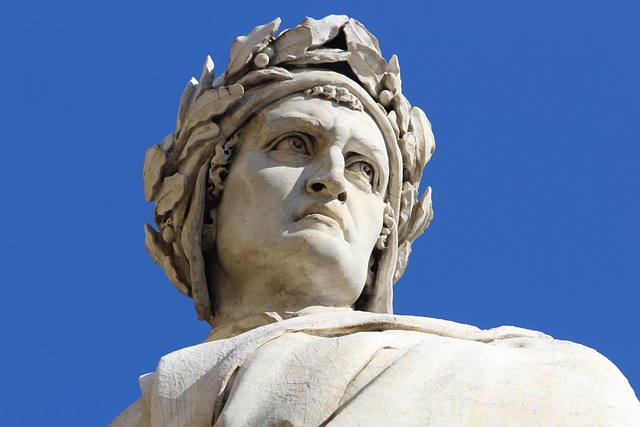For Dante Alighieri, principles were incarnate and errors had human faces, even when the subject was the internal problems of the Church.
Newsroom (08/01/2022 09:00, Gaudium Press) In every branch of human activity there emerges, more or less on a daily basis, an exponential man or woman who personifies his or her work, who surpasses all others, who remains, in his or her field, without rival. A Dominican monk[1] once asked himself about the painter Fra Angelico: “Is it not permissible to maintain that in painting he remained unrivaled, like St. Thomas in Theology, and like Dante in poetry?“[2] Such great praise for the Italian artist!
Indeed, it is unimaginable to compete with St. Thomas Aquinas in the field of theology. His teachings were largely taken by the Catholic Church as the secure foundation of its doctrine and a true beacon of orthodoxy
With Dante Alighieri, something similar occurs. He became a blossom of glory in the field of poetry with his “Divine Comedy”, a fascinating poem, an account of a fictional journey through the realms of the other, supernatural world: Hell, Purgatory, and Paradise.
Such a poem is divided into three books, each consisting of 33 cantos (Italian plural canti) [3] in rhymed decasyllable tercets, in a chained and uniquely alternating manner, the structure of which, originally created for this work, became known as the “Dantean terzina.”[4] “No literary work was undoubtedly more fully the Church’s than the Divine Comedy.”[5]
Harsh criticism of the ecclesiastics of his time
Dante Alighieri was born in Florence in the year 1265. He married Gemma Donati at twenty, with whom he had three children (two boys and a girl). He actively participated in the politics of his time, being, in 1300, elected one prior of a group of six, of the Council of Florence, which was already an organized city-state with an independent democratic government. He died on September 14, 1321, in exile in Ravenna, just after he finished writing “Paradise”.
One characteristic of the “king of poets” remains by no means implicit in his masterpiece: “For him, principles were incarnate and errors had human faces.”[6]And this theme remained even when the subject was the internal problems of the Church.
Thus, the historian Daniel-Rops states: “The Divine Comedy presents Hell and Purgatory populated by cardinals ‘so fat that one must carry them‘; by ‘ravenous wolves in shepherds’ clothing’; by ‘impudent clerics’. And the poet is indignant when he recalls that ‘Peter and the chosen vessel of the Holy Spirit – St. Paul – went barefoot and thin, and ate where they could!’ Marvelous cries of protest, and the tearing pain of truly Christian souls.”[7]
It is Dante who addresses the popes of his time with this harsh rebuke: “You have modeled a god of silver and gold: the difference between you and the idolater is that the latter worships one god and you worship a hundred.” (Inferno, Canto XIX, 112-114.)[8]
“No one,” continues Daniel-Rops, “spoke with more ardor and tenderness of the Spouse of Christ than that of whom the invectives against some of its chiefs and some of its institutions are often quoted with some complacency. He did this because he felt, for Her, the Church, the filial sentiments of an imperious demand. He wanted to see Her infinitely pure, infinitely beautiful, rigorously faithful to the precepts of Her Master, free of all the scabs with which the misery of man covers this chosen vessel of the Holy Spirit.
“Indeed, if this Church has deserved the severest criticism, Her greatness has consisted in never having accepted this taint and in having known, not infrequently, to find again the leaven that would leaven the dough.”[10]
“In shepherd’s clothing, ravenous wolves…”
Seven centuries separate us from the death of this luminary of Western Christianity. What would Dante Alighieri say – or rather write – about the problems that afflict the Catholic Church today?
Although originally set in a context quite different from that which predominates today, do they not seem especially applicable to the reality we now find ourselves living in?
The poet sets them as being uttered by Saint Peter, addressing the bishops:
“The spouse of Christ has never nurtured been
On blood of mine, of Linus and of Cletus,
To be made use of in the quest of gold;
But in the quest of this delightful life
Sixtus and Pius, Urban and Calixtus,
After much lamentation, shed their blood.
Our purpose was not, that on the right hand
Of our successors should in part be seated
The Christian folk, in part upon the other;
Nor that the keys which were to me confided
Should e’er become the escutcheon on a banner,
That should wage war on those who are baptized;
Nor I be made the figure of a seal
To privileges venal and mendacious,
Whereat I often redden and flash with fire.
In garb of shepherds the rapacious wolves
Are seen from here above o’er all the pastures!
O wrath of God, why dost thou slumber still?
(Paradise, Canto XXVII, 40-53)
By João Paulo Bueno
Compiled by Sandra Chisholm
[1] M. A. Janvier, O.P.
[2] “Of Fra Angelico is it not permitted to maintain that in painting he remained without rival, like St. Thomas in theology, like Dante in poetry?”
[3] With the exception of the “Inferno,” where the first verse serves as an introduction.
[4] The verses follow the scheme ABA-BCB-CDC-DED, and so on, and are written in Tuscan.
[5] ROPS, Henri-Daniel. History of the Church of Christ: The Church of the Cathedrals and the Crusades. Sao Paulo: Quadrante, 1993, p. 674.
[6] Id., p. 670.
[7] Id., p. 139.
[Id., p. 618.
[Id., p. 674.
[10] Id., p. 139.



































